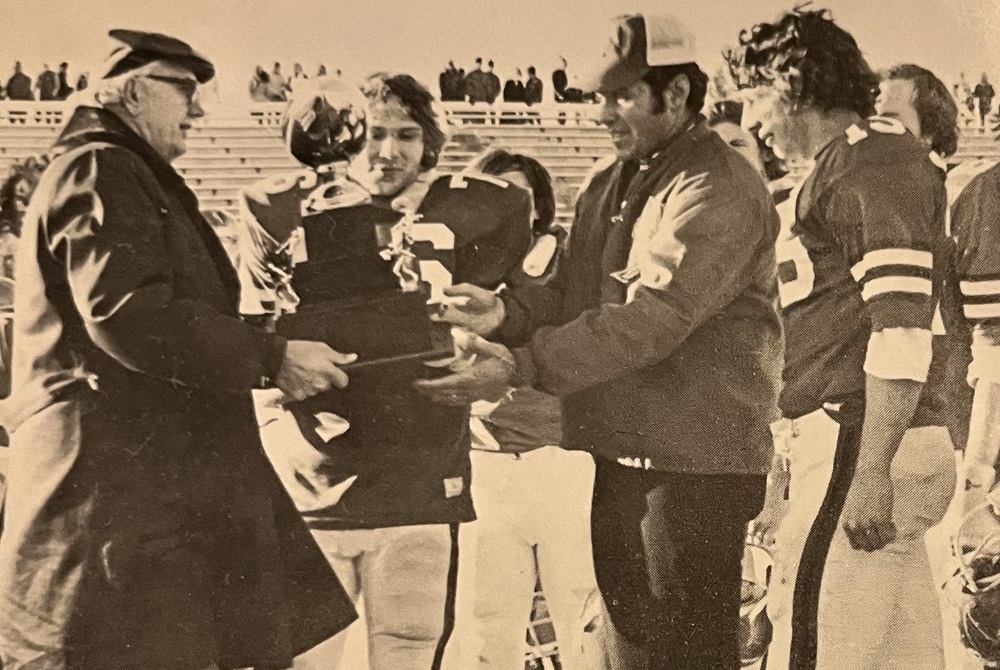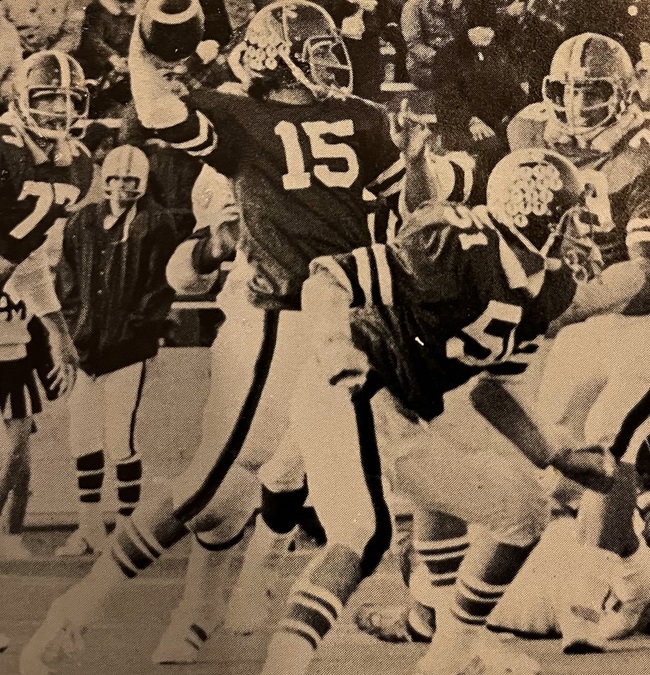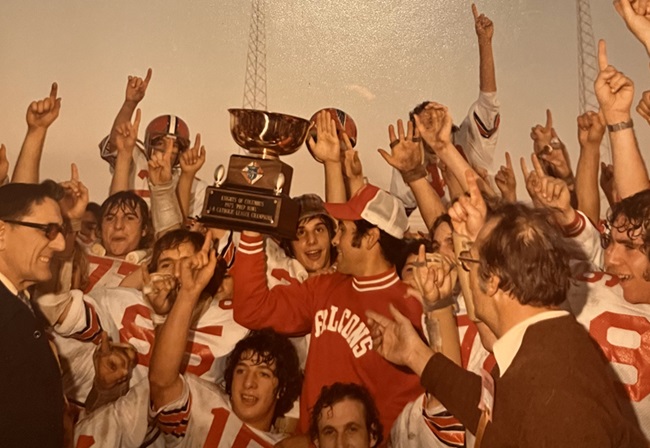
Ithaca Finds a Hero in Hessbrook
November 23, 2012
By Geoff Kimmerly
Second Half editor
DETROIT – Logan Hessbrook started at quarterback for Ithaca’s junior varsity last season as a sophomore, and probably would start for a few hundred teams that don't have the luxury of all-state quarterbacks every season.
But neither takes away from the fact that he’d taken only one or two reps at the position during the last four weeks of practice. With junior superstar Travis Smith behind center, there really wasn't a need.
So when Smith was injured on his team's second play of Friday’s MHSAA Division 6 Final at Ford Field, his coach and top receiver were quick to offer encouragement.
“I said, ‘Listen bud. Travis isn't coming back,’” Ithaca coach (and Logan’s uncle) Terry Hessbrook said. “’We’re going to live and die with you. Just play the way you’re capable of playing.’”
Senior Markes Gadlen – a three-year starting receiver and the third-string quarterback – also took Logan aside. “I can’t see over the line,” Gadlen told him, “so I was just letting him know he’s all we've got.”
And Hessbrook was more than enough.
Ithaca won its third straight MHSAA title – with a third quarterback leading the way – by downing Constantine 37-27. It was the second straight season the teams met in the championship game.
And Hessbrook was the most unlikely of heroes. Sure, he’s a starting defensive back. But in his number 26 jersey, he couldn't have looked more out of place running the offense – until he led it to four straight scores to break the game open midway through the fourth quarter.
“I was obviously nervous at the beginning, but I settled in as the game went on, and my teammates kept picking me up,” Hessbrook said. “They were saying you’re all right, we can help you, we can pick you up. The linemen did a great job blocking, the receivers did a good job blocking on the edge, and they ran good routes. We just did what we could do.”
The win also gave Ithaca its third straight 14-0 season. That streak of 42 straight victories is fourth in MHSAA history and two from tying for second. It’s also second and one win shy of the longest streak among those that took place entirely within the playoff era that began in 1975.
The Yellowjackets have beaten opponents by an average of 37 points over those games. And this season, they scored their most points (675, good for third-most in MHSAA history) and gave up their fewest (110) of the streak. But this game had all the signs of a streak buster.
“This might be the toughest game we've ever been a part of,” Terry Hessbrook said. “We haven’t faced a lot of adversity during this run. And a lot of our games have been over in the second or the third quarter. For these players to continue to fight the way they (were), I can’t put it into words and I can’t express how proud I am of the way they just kept fighting.”
Smith was hurt on a four-yard run on his team’s second play from scrimmage. But after that and despite his sizable absence, this rematch began playing out a lot like the teams' matchup in 2011.
Like last season, Ithaca and Constantine went into halftime tied – this time 20-20. And like last season, Ben Mallo and the Falcons’ run game was doing just about everything they wanted.
That’s hardly rare – the team ran for 6,407 yards on the season. And in this game, Constantine ran for 287 yards during the first half, and Mallo had 147. But after the Yellowjackets reviewed their assignments during halftime, the Falcons added only 130 more yards over the final two quarters.
 And Logan Hessbrook looked like yet another star Ithaca quarterback. After completing just 2 of 5 passes this season heading into the game, he hit 7 of 13 for 104 yards and two touchdowns. He ran for 113 yards and two more scores.
And Logan Hessbrook looked like yet another star Ithaca quarterback. After completing just 2 of 5 passes this season heading into the game, he hit 7 of 13 for 104 yards and two touchdowns. He ran for 113 yards and two more scores.
“ We've struggled all year stopping people defensively. So when we game-planned to stop Ithaca, it wasn't to stop Travis Smith, so to speak,” Constantine coach Shawn Griffith said. “They did step up, I think, and show the ability to run a little bit better than we thought they were capable of doing when we came into the game. And they still hit the big pass when they needed to. You don’t win 42 straight football games because of one good football player. You've got to have a stable of them, and he’s got quite a few.”
While Ithaca’s second-half possessions amounted to 17 points, Constantine’s turned into seven – and included a turnover on downs, a lost fumble and a punt that was blocked by senior Tyler Gibson and eventually led to a field goal.
Constantine did end up with 504 total yards. Mallo ran for 207 and a touchdown – and had 12 tackles at linebacker – and sophomore Justin Hull added 102 yards and a score on the ground. Senior Tommy Reed, who didn't get to play quarterback in last season’s Final because of an injury, ran for a score and had 10 tackles at safety.
The Falcons finished 11-3 and made their run after finishing third in the Kalamazoo Valley Association.
“We were all seniors, and we all wanted to get back. We didn't want football to end, because for most of us this is our last chance,” Reed said. “Once the playoffs came, we finally started playing as a team. Our defense picked up and our offense continued to roll.
“To get back here, we had a couple turnovers that went our way, and we were able to convert on every turnover. This game was the opposite. We had a couple of turnovers and we couldn't convert, and the one we turned over to them they ended up converting. That’s what hurt us.”
Senior Jared Evers ran for one score and caught a pass for another for Ithaca. Senior Josh Capen had a team-high 10 tackles.
Click for full statistics and to watch a replay of the game. See below for the full press conference.
PHOTOS: (Top) Ithaca quarterback Logan Hessbrook (26) eludes Constantine defenders during one of his runs Friday. (Middle) Ithaca receiver Markes Gadlen hauls in a touchdown pass midway through the second quarter. (Click for more from Terry McNamara Photography.)

'Refuse to Lose' Divine Child Set Tone for Teams to Come with 1st Class B Title
By
Brad Emons
Special for MHSAA.com
November 15, 2024
There was no more conjecture, no newspaper or Associated Press polls to determine the state football champions.
The champion was no longer decided on paper, but out on the field as the MHSAA launched its first playoff tournament in 1975.
Only 16 total teams over four classes were invited to the dance.
And a school with an already a rich football heritage in Dearborn Divine Child proved it on the field with a 21-0 win over Saginaw MacArthur in the Class B title game before 4,000 fans at Central Michigan University’s Perry Shorts Stadium in Mount Pleasant.
In the Semifinals, MacArthur had outlasted Flint Ainsworth, 44-38, as senior halfback Mark Neiderquill rushed for 285 yards and four touchdowns, while Divine Child ousted Sturgis, 20-3.
In the frigid championship final on Nov. 22, the Falcons’ defense held MacArthur’s high-octane offense to seven first downs and 74 yards rushing. They caused three turnovers, with two fumble recoveries and an interception leading to all three of their TDs.
“I thought we could move the ball, but MacArthur was tough,” DC coach Bob LaPointe told the Detroit Free Press.
In the second quarter, Pat Doyle returned an interception 28 yards for a TD, and Mike Surmacz added the PAT for a 7-0 Divine Child advantage.
 “That first interception really got us rolling,” LaPointe said. “Doyle can run the 40 in 4.9 and speed is what made that touchdown. But he got good blocking, too.”
“That first interception really got us rolling,” LaPointe said. “Doyle can run the 40 in 4.9 and speed is what made that touchdown. But he got good blocking, too.”
Two minutes later, Mike Wiacek gave DC another scoring opportunity when he recovered a MacArthur fumble at the Generals’ 24. Nine plays later, senior quarterback Dan Faletti swept right end and scored on a three-yard bootleg for a 14-0 lead.
“The big thing is that they had a good running back that we had to make sure we kept under control,” said Faletti, who went on to play at Eastern Michigan University before a neck injury prematurely ended his career as a sophomore. “We pretty much got the lead, and Bob was conservative. I just remember scoring that touchdown, and my picture made the paper the next day.”
Neither team could move the ball in the third quarter. There were no first downs.
All-stater Mike Svihra then picked up a fumbled lateral in the fourth quarter and ran 10 yards for the game’s final TD.
“It was not a lot of offense; it was a bitter, cold day,” said Faletti, who went on to work for the Department of Defense for 20 years and Ford Motor Co. before recently retiring. “Bob LaPointe ran a conservative offense. We did ball-control, we didn’t put tons of points on the board ... we didn’t fumble the ball. We didn’t throw interceptions.”
The game, ironically, was played on AstroTurf, not on real grass.
“Everyone makes a bit deal of it, but there really isn’t that much difference,” LaPointe added afterwards. “The only thing I regretted about this game was that I could dress only 44 of my 56 players under the rules. It was tough (to) tell the other 12 they couldn’t suit up.”
An 18-12 loss to Madison Heights Bishop Foley during the final regular-season game, spoiling what would have been an undefeated season in 1974, had left the Falcons distraught – but even more galvanized as they made preparations for the 1975 campaign.
The Falcons also changed their offense in 1975, switching to a triple-option attack that LaPointe got from Notre Dame. The offense proved to be good enough for a 9-0 regular season and an MHSAA playoff berth.
“We were an underdog the whole thing, the whole time, we were the underdog in every big game we played in, but we didn’t allow people to beat us,” said Wes Wishart, who coached the linebackers and offensive line that season before taking over the head coaching reins for the Falcons from 1978-95. “We refused to lose, and that was the motto. From ’74 on those group of kids said, ‘We refuse to lose.’ You use that phrase as a coach all the time, but this group of kids lived it. They were the ones that invented it. When things got tight, ‘refuse, refuse, refuse.’ We’re not backing off from anybody. Great group of young men, great players.”
 During the regular season, DC earned victories over highly-touted Flint Powers Catholic (20-14), previously unbeaten Southgate Aquinas (26-12) and Allen Park Cabrini (12-8).
During the regular season, DC earned victories over highly-touted Flint Powers Catholic (20-14), previously unbeaten Southgate Aquinas (26-12) and Allen Park Cabrini (12-8).
That set up a Catholic League Prep Bowl showdown in the final game of the regular season against highly-touted 8-0 Birmingham Brother Rice, which was ranked No. 1 in the final regular-season AP Class A poll.
Although the Falcons were a decided underdog, the AA division champs upended Rice, 7-0, before a packed crowd at Eastern Michigan University’s Rynearson Stadium to snap the Warriors’ 22-game winning streak thanks to Jim Kempinski’s fumble return for a seven-yard touchdown as he snagged the ball in mid-air and never broke stride while crossing into the end zone.
“We played our butts off,” Faletti said. “It was a dog-eat-dog game.”
It was DC’s 11th Catholic League title, but more importantly put the Falcons into the first MHSAA Playoffs against Sturgis in a Semifinal match at C.W. Post Field in Battle Creek.
“I remember everything was brand new; nobody knew what they were doing,” said Wishart, who guided the Falcons to the 1985 Class A crown as their head coach. “Coach LaPointe on Monday had to get the school to get our hotel rooms in Battle Creek.”
Steve Toepper booted a 27-yard field goal for Sturgis to open the scoring, but DC responded with 20 unanswered points.
In the final quarter, DC’s Rick Rogowski scored on a seven-yard run with 9:23 left (after Steve Savini recovered a fumble caused by Joe Wiercioch) followed by a 10-yard TD run by Faletti with only six minutes to go (after Svihra recovered a fumble).
That sent the Falcons into the Final at CMU, where their defense suffocated MacArthur (9-2).
“We kind of ran a special outside zone. We had to quickly change (how) we would defend that. We shut them down,” said Wishart, who spent 50 years in CYO and high school coaching before retiring to live in New York. “There was no doubt, we were more physical than they were. We were blue collar kids. Typical Divine Child kids, hard-working, never give up.
“We believed desperately in defending Divine Child at all costs because we were a smaller school, so we had an attitude that still lingers there today that we all cultivated. We were going to be a physical squad.”
Meanwhile, what made the Falcons special and unique that title season was their “one for all and all for one” attitude.
“Everybody was the same,” Faletti said. “When we went between the lines, we were all equal. As captain, I got to be command as quarterback in the huddle. But off the field we were all equal. We played like 22 seniors. We were ready for this game.”
PHOTOS (Top) Dearborn Divine Child coaches and players receive the Class B championship trophy after winning the inaugural title game in 1975. (Middle) Falcons quarterback Dan Faletti throws a pass during the Final. (Below) Divine Child players and coaches raise their Prep Bowl trophy in celebration. (Championship game photos courtesy of Dearborn Divine Child yearbook. Prep Bowl photo provided by Dan Faletti.)

